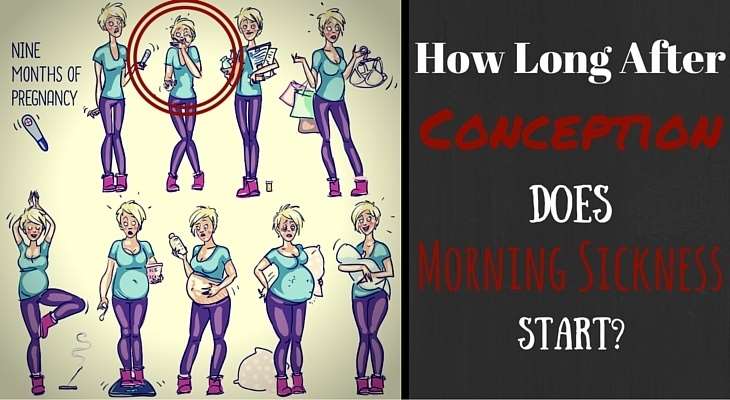[Begin scenario] We’ve all seen the movies…
A woman all dolled up, lipstick beaming, having dinner at a restaurant or doing her thing at work.
Then, all of a sudden, the woman books it to the bathroom and heaves into a stall!
Side thought: Good thing she doesn’t puke somewhere even more embarrassing, like all over the waiter, her co-worker or even her boss.
She is probably thinking, what the “french” just happened?!
She stands up looking completely disheveled, that beaming lipstick smeared all over her face, and announces, “I think I might be pregnant!” [End Scenario]
In the movies, the birth always seems to depict labor as progressing from water breaking to heading to the hospital in a panic to delivering a 10-pound purplish baby.
So let me ask you this…
Was that scenario an accurate portrayal of morning sickness?
Maybe. Maybe not.
All women are different. Some women suffer from this and others do not.
Table Of Contents
So How Long After Conception Does Morning Sickness Start?
Could you really be on a date or at a meeting with your boss without having an inkling that you might vomit all over their shoes?
Let’s Clear Up The (Mis) Conception, Shall We?
The first thing to understand is to know when you actually conceive.
Most OB/GYNs will set the date of conception as the first day of your last period. If you’re an actual human with a menstrual cycle, you’re probably already rolling your eyes.
Even the American Pregnancy Association recognizes that ovulation timing can be complex.
The egg can be released anywhere from 11 to 21 days after the first day of your cycle.
Depending on the length of your cycle, ovulation could also occur 12 to 16 days before your next period.
That means that if you have a 21-day cycle, you might ovulate on day 6.
If you aren’t sure when you ovulated, the first date of your last period is all anyone has to go by.
If you got pregnant on the only day of the year that you had sex (not uncommon for the second, third and fourth pregnancy), you can be fairly certain that you conceived on that day or within 3 to 5 days after that.
That’s because sperm can live for 3 to 5 days while waiting for the egg to make its way down to the uterus.
Enough With 6th Grade Health Class – When Does The Puking Start?
So, this might blow your mind: you can be two or three weeks pregnant before you actually conceive.
Morning sickness typically begins around week six.
That means that nausea can set in within two weeks of conception.
(That also means that the movies may have it right. You might not even know you’re pregnant before you puke in your boss’ purse.)
According to Medline Plus, most nausea associated with pregnancy will dissipate by the third or fourth month.
The bad news is that the majority of pregnant women experience some nausea.
It’s sad but true.
Even Kim Kardashian had a bad bout of morning sickness.
Why So Soon?
If you’re bummed that you didn’t even get to celebrate the fact that you were pregnant before you started puking, we can commiserate with you.
Never-ending nausea is no fun.

Why Does This Even Happen?
Although doctors aren’t exactly sure what causes you to feel sick during pregnancy, they have a few theories.
According to Medical News Today, most of these hypotheses have to do with the hormone surge that you experience after conception.
After the egg is fertilized, your estrogen and progesterone levels rise.
So do your levels of HCG, a hormone that the embryo starts to produce immediately.
Some doctors think that this throws your body out of whack, and it responds by feeling extremely queasy.
Your hormones will level out a bit in the second trimester, which may be why you start to feel better.
Why Does My Morning Sickness Last All Day?
If you’re reading this on your smartphone with your head in the toilet, you’re probably a little irked that it’s 6 p.m. and you’re still spewing chunks.
While it’s called morning sickness, most mothers will tell you that it doesn’t necessarily have anything to do with the morning.
Pregnancy nausea can be triggered by strong smells, stress or low blood sugar any time of day.
And I mean ANY TIME of day.
Because low blood sugar can make you nauseated if you’re pregnant, you’re more likely to feel sick after you haven’t eaten all night.
Relax – It Could Be Worse
Although this doesn’t last forever, about 1 percent of women develop hyperemesis gravidarum.
This extreme form of pregnancy nausea can make you sicker than you felt during your worst hangover.
It can cause uncontrollable vomiting and can last throughout your entire pregnancy.
In fact, any type of morning sickness can last until your baby’s born, although that’s uncommon.
Typically this is not a health risk.
However, hyper gravidarum can affect your health as well as the baby.
It can throw off your electrolytes, upset your kidney function and lead to dramatic weight loss.
It can also cause premature birth and low birth weight in infants.
Check out what these celebrities had to say about morning sickness during their pregnancies.
The Bottom Line
If you think you might be pregnant and your stomach is a little unsettled, get yourself a pregnancy test.
You might have eaten some bad chicken, or you might be about eight months away from the best type of birth control on the planet.
If you just started feeling ill, it doesn’t mean that you just conceived two weeks ago.
Morning sickness can come on during the second or third trimester too, although it’s less likely.
If at any time the vomiting is severe, drag yourself to the doctor.
Let us know if you experienced morning sickness.
Show some support for the other mothers-to-be going through it in the comments below, or let us know if you have any questions.
Now, go eat some saltines to settle your stomach.


Leave a Reply